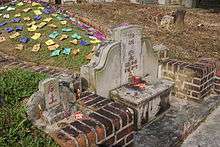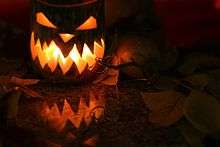Qingming Festival
| Qingming | |
|---|---|
|
Burning paper gifts for the departed. | |
| Official name |
Qingming Jie (清明节) Tomb Sweeping Day (扫坟节) Ching Ming Festival (清明节) |
| Observed by | Chinese |
| Significance | Remembering past ancestors |
| Observances | Cleaning and sweeping of graves, ancestor worship, offering food to deceased, burning joss paper |
| Date |
15th day from the Spring Equinox 4, 5 or 6 April |
| 2015 date | 5 April |
| 2016 date | 4 April |
| 2017 date | 4 April |
| 2018 date | 5 April |
| Related to |
Ghost Festival Obon |
| Qingming Festival | |||||||||||||||||||||||||||
| Traditional Chinese | 清明節 | ||||||||||||||||||||||||||
|---|---|---|---|---|---|---|---|---|---|---|---|---|---|---|---|---|---|---|---|---|---|---|---|---|---|---|---|
| Simplified Chinese | 清明节 | ||||||||||||||||||||||||||
| Literal meaning | "Pure Brightness Festival" | ||||||||||||||||||||||||||
| |||||||||||||||||||||||||||
The Qingming or Ching Ming Festival, also known as Tomb-Sweeping Day in English,[1][2] is a traditional Chinese festival on the first day of the fifth solar term of the traditional Chinese lunisolar calendar. This makes it the 15th day after the Spring Equinox, either 4 or 5 April in a given year.[3][4][5] Other common translations include Chinese Memorial Day and Ancestors' Day.
Qingming has been regularly observed as a statutory public holiday in China. In Taiwan, the public holiday is now always observed on 5 April to honor the death of Chiang Kai-shek on that day in 1975. It became a public holiday in mainland China in 2008.
In the mainland, the holiday is associated with the consumption of qingtuan, green dumplings made of glutinous rice and barley grass. In Taiwan, the similar confection is known as caozaiguo or shuchuguo.
A similar holiday is observed in the Ryukyu Islands, called Shīmī in the local language.
Origin
The festival originated from the Cold Food Festival ("Hanshi Festival"), established by Chong'er, Duke Wen of Jin, during the Spring and Autumn period. The festival was a memorial for his retainer Jie Zitui, who had loyally followed him during his years of exile. Supposedly, he once even cut meat from his own thigh to provide Chong'er with soup. Once Chong'er was enthroned as duke, however, Jie considered his services no longer required and resigned. Although Duke Wen was generous in rewarding those who had helped him in his time of need, he long passed over Jie, who had moved into the forest with his mother. Duke Wen went to the forest in 636 BC but could not find them. He then ordered his men to set fire to the forest in order to force Jie out. When Jie and his mother were killed instead, the duke was overcome with remorse and ordered three days without fire to honor Jie's memory. The city erected over the former forest is still called Jiexiu (lit. "Jie's rest").
The present importance of the holiday is credited to the Tang Emperor Xuanzong. Wealthy citizens in China were reportedly holding too many extravagant and ostentatiously expensive ceremonies in honor of their ancestors. In AD 732, Emperor Xuanzong sought to curb this practice by declaring that such respects could be formally paid only once a year, on Qingming.[6]
Celebration

Qingming Festival is when Chinese people visit the columbaria, graves or burial grounds to pray to their ancestors.
The Qingming Festival is an opportunity for celebrants to remember and honour their ancestors at grave sites. Young and old pray before the ancestors, sweep the tombs and offer food, tea, wine, chopsticks, joss paper, and/or libations to the ancestors. The rites have a long tradition in Asia, especially among farmers. Some people carry willow branches with them on Qingming or put willow branches on their gates and/or front doors. They believe that willow branches help ward off the evil spirit that wanders on Qingming.
On Qingming, people go on family outings, start the spring plowing, sing, and dance. Qingming is also a time when young couples traditionally start courting. Another popular thing to do is to fly kites in the shapes of animals or characters from Chinese opera.[7] Another common practice is to carry flowers instead of burning paper, incense, or firecrackers.[8]

Despite having no official status, the overseas Chinese communities in Southeast Asian nations, such as those in Singapore and Malaysia, take this festival seriously and observe its traditions faithfully. Some Qingming rituals and ancestral veneration decorum observed by the oversea Chinese in Malaysia and Singapore can be dated back to Ming and Qing dynasties, as the oversea communities were not affected by the Cultural Revolution in Mainland China. Qingming in Malaysia is an elaborate family function or a clan feast (usually organized by the respective clan association) to commemorate and honour recently deceased relatives at their grave sites and distant ancestors from China at home altars, clan temples or makeshift altars in Buddhist or Taoist temples. For the oversea Chinese community, the Qingming festival is very much a family celebration and, at the same time, a family obligation. They see this festival as a time of reflection and to honour and give thanks to their forefathers. Overseas Chinese normally visit the graves of their recently deceased relatives on the nearest weekend to the actual date. According to the ancient custom, grave site veneration is only feasible ten days before and after the Qingming Festival. If the visit is not on the actual date, normally veneration before Qingming is encouraged. The Qingming Festival in Malaysia and Singapore normally starts early in the morning by paying respect to distant ancestors from China at home altars. This is followed by visiting the graves of close relatives in the country. Some follow the concept of filial piety to the extent of visiting the graves of their ancestors in mainland China. Traditionally, the family will burn spirit money and paper replicas of material goods such as cars, homes, phones and paper servants. In Chinese culture, it is believed that people still need all of those things in the afterlife. Then family members take turns to kowtow three to nine times (depending on the family adherence to traditional values) before the tomb of the ancestors. The Kowtowing ritual in front of the grave is performed in the order of patriarchal seniority within the family. After the ancestor worship at the grave site, the whole family or the whole clan feast on the food and drink they brought for the worship either at the site or in nearby gardens in the memorial park, signifying family reunion with the ancestors. Another ritual related to the festival is the cockfight,[9] as well as being available within that historic and cultural context at Kaifeng Millennium City Park (Qingming Riverside Landscape Garden).[10][11]
The holiday is often marked by people paying respects to those who died in events considered sensitive.[12] The April Fifth Movement and the Tiananmen Incident were major events in Chinese history which occurred on Qingming. When Premier Zhou Enlai died in 1976, thousands visited him during the festival to pay their respects. Many also pay respects to victims of the Tiananmen Square protests in 1989 and Zhao Ziyang.[13]
In Chinese tea culture
The Qingming festival holiday has a significance in the Chinese tea culture since this specific day divides the fresh green teas by their picking dates. Green teas made from leaves picked before this date are given the prestigious 'pre-qingming' (清明前) designation which commands a much higher price tag. These teas are prized for having much lighter and subtler aromas than those picked after the festival.
In painting
The famous Qingming scroll by Zhang Zeduan is an ancient Chinese painting which portrays the scene of Kaifeng city, the capital of the Song Dynasty during a Qingming festival.


In literature
Qingming was frequently mentioned in Chinese literature. Among these, the most famous one is probably Du Mu's poem (simply titled "Qingming"):
| Traditional Chinese | Simplified Chinese | pinyin | English translation |
|---|---|---|---|
| 清明時節雨紛紛 | 清明时节雨纷纷 | qīng míng shí jié yǔ fēn fēn | A drizzling rain falls on the Mourning Day; |
| 路上行人欲斷魂 | 路上行人欲断魂 | lù shàng xíng rén yù duàn hún | The mourner's heart is breaking on his way. |
| 借問酒家何處有 | 借问酒家何处有 | jiè wèn jiǔ jiā hé chù yǒu | Inquiring, where can a wineshop be found? |
| 牧童遙指杏花村 | 牧童遥指杏花村 | mù tóng yáo zhǐ xìng huā cūn | A cowherd points to Apricot Flower Village in the distance. |
Although the date is not presently a holiday in Vietnam, the Qingming festival is mentioned (under the name Thanh Minh) in the epic poem The Tale of Kieu, when the protagonist Kieu meets a ghost of a dead old lady. The description of the scenery during this festival is one of the best-known passages of Vietnamese literature:
| Hán Nôm | Vietnamese | English translation |
|---|---|---|
| 𣈜春𡥵燕迻梭, | Ngày xuân con én đưa thoi | Swift swallows and spring days were shuttling by; |
| 韶光𠃩𨔿㐌外𦒹𨑮。 | Thiều quang chín chục đã ngoài sáu mươi | Of ninety radiant ones three score had fled. |
| 𦹵𡽫撑羡蹎𡗶, | Cỏ non-xanh tận chân trời | Young grass spread all its green to heaven's rim; |
| 梗梨𤽸點沒𢽼花, | Cành lê trắng điểm một vài bông hoa | Some blossoms marked pear branches with white dots. |
| 清明𥪞節𣎃𠀧, | Thanh Minh trong tiết tháng ba | Now came the Feast of Light in the third month |
| 礼羅掃墓,噲羅踏清。 | Lễ là Tảo mộ, hội là Đạp thanh | With graveyard rites and junkets on the green. |
| 𧵆賒奴㘃燕, | Gần xa nô nức yến oanh | As merry pilgrims flocked from near and far, |
| 姉㛪懺所步行制春。 | Chị em sắm sửa bộ hành chơi xuân | The sisters and their brother went for a stroll. |
See also
- Along the River During Ching Ming Festival by Zhang Zeduan
- Cold Food Festival, three consecutive days starting the day before the Qingming Festival
- Day of the Dead, the Mexican counterpart of both the Qingming and Bon Festivals.
- Double Ninth Festival, the other day to visit and clean up the cemeteries in Hong Kong
- Bon Festival, the Japanese counterpart of the Qingming Festival.
- Hansik, a related Korean holiday on the same day
- Songkran, South and Southeast Asia equivalents
- Traditional Chinese holidays
References
- ↑ "General holidays for 2015". GovHK. Retrieved 2014-08-25.
- ↑ "Macau Government Tourist Office". Macau Tourism. Retrieved 2014-08-25.
- ↑ "Traditional Chinese Festivals". china.org.cn. 2007-04-05. Retrieved 2014-08-25.
- ↑ "Tomb Sweeping Day". Taiwan.gov.tw. Retrieved 2014-08-25.
- ↑ http://www.discoverhongkong.com/uk/see-do/events-festivals/chinese-festivals/ching-ming-festival.jsp
- ↑ "寒食清明节:纪念晋国大夫介之推——华夏文明——中国经济网". Cathay.ce.cn. Retrieved 2014-08-25.
- ↑ "Archived copy". Archived from the original on 15 April 2009. Retrieved 8 April 2009.
- ↑ "Asia News - South Asia News - Latest headlines – News, Photos, Videos". UPIAsia.com. 2012-07-22. Retrieved 2014-08-25.
- ↑ "Festival of Pure Brightness". Uiowa.edu. Retrieved 2014-08-25.
- ↑ "Millennium City Park, Kaifeng, Henan". Travelchinaguide.com. Retrieved 2014-08-25.
- ↑ "Qingming Riverside Landscape Garden". Cultural-china.com. Retrieved 2014-08-25.
- ↑ "Celebration". China Daily. 3 March 2013. Retrieved 18 March 2014.
- ↑ "China clamps down on Qing Ming". Straits Times. 8 April 2009. Retrieved 18 March 2014.
External links
| Wikimedia Commons has media related to Qingming Festival. |

